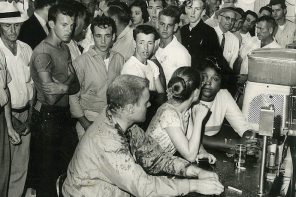Just four years ago, the pundits told us the future of American democracy was in the hands of so-called “values voters” who, it was reported with great certainty, turned out in huge numbers for George W. Bush.
Subsequent studies have shown that the 2004 exit polls that conclusion was based on were deeply flawed. The pollster’s question was, “Which one issue mattered most in deciding how you voted for president?” Respondents were given seven choices, with “moral values” tucked into a list of seven policy areas, such as “economy/jobs,” “health care,” “Iraq.”
“Moral values” is at best a broad category; at worst an utterly useless one, especially in a pluralistic society. Unsurprisingly, it was the top priority for 22 percent of voters (besting all other categories), with 80 percent of those respondents voting for George W. Bush.
Political journalists, whose own values are dominated by an obsessive keeping up with the Indiana Joneses at competing media outlets (witness the proliferation of safari jackets in televised stand-ups from the field), assumed they’d found the Holy Grail of contemporary American elections.
Where are those values voters this election season? They’ve faded, like hula hoops. We’re back to “it’s the economy, stupid,” and everyone knows Americans leave their values at the door when they enter the vaults of commerce.
But like most fads, the values voter brand hasn’t disappeared completely. It lingers on in minds of many on the Christian Right who believe themselves to hold the only real values on the continent. So we have the “Values Voters Summit,” the ”Values Voters Debate,” and “ValuesVoters.org.”
Superficially, the gross interpretation errors of the press in its 2004 reporting about values voters hurts liberals and progressives, whose values aren’t generally recognized as values in the public discourse. Red states have values, blue states don’t, despite the fact that red states have higher rates of divorce and teen pregnancy than their red neighbors. The Right refers to those who hold liberal and progressive values (for instance, the value that we are responsible for ourselves and for each other) as “radical leftists.” In the past, the Left played into this label by steering clear of talk about the values that underlie their policy proposals. And the branding of the Right as the party of “values,” with its sarcastic overtones, might perpetuate this bad habit. Talk about values is tainted by its association with narrow-mindedness.
Still, the error might prove to be “the right mistake,” which is also the title of Walter Mosley’s new novel. He’s returned to his character, the ex-con Socrates Fortlow, in a story about courage and redemption. Of a friend’s troubles with a woman, Socrates believes he made the right mistake: “You learn right away from sumpin’ like that.” And so might we from the debunked theory of the values voter.
Here’s how, and here’s how this education may make the difference in the election:
There are many historical trends feeding into the Left’s reticence on discussing values. In America, progressives have long associated their policies with the supposedly value-neutral human sciences. Progressives don’t need to argue values, they just need to create neutral, techno-wondrous machines of economics and governance and they will produce progressive outcomes just like, well, hula hoops I guess.
Also, when tolerance is a key value, the Left fears that public confrontation on moral matters will seem intolerant.
Those 20th-century progressives who weren’t overt Comtian positivists with blind faith in science and progress were, speaking very broadly of their theoretical orientation, socialists or Marxists. The obvious shortcomings of Marxist theory and the betrayals and failures of various communist regimes left progressive intellectuals with shaky foundations.
Well, there was John Maynard Keynes, whose economic theories remain valid, even critical, in the current crisis. But the single-minded focus on economic theory helped feed liberal obsession with the power of reason and the so-called “rational actor” theories of human behavior. Just give people the facts, this theory said, and their access to transcendent, universal reason will lead them to the right conclusion.
It’s eerily like earlier progressive technological solutions to human organization. Build the right assembly line of thought, and the right answers pop out the other end. Recent insights in the cognitive sciences, from Antonio Damasio to George Lakoff and many others, reveal the error of our ways. There’s no such thing as unemotional reason. There’s no such thing as a “rational actor.”
Two other historical trends bear mentioning. The first is the mistaken view that the First Amendment’s ban on government-established religion means that all religious talk is to be kept out of the public sphere. Holy smoke, if I get my values from my spiritual pursuits, how can I effectively advocate for my values without mentioning those pursuits?
Connected to this, of course, is the false separation of private and public spheres. Our hearts come with chambers and our brains with hemispheres, but we hear no demands for and have no respected theories of the half-hearted or half-witted. Our private selves are public selves, and our public selves private.
It should be obvious from the above that mistakes like the 2004 invention of so-called values voters don’t happen in a historical vacuum. The past clears the path for these mistakes, and the mistakes have future consequences.
Yeah, you say, But do we really need to know this to effectively counter the consequences of this error in 2008? Of course we do.
Consider this: The man who brought a monkey doll dressed as Barack Obama to a Sarah Palin rally in Johnstown, Pennsylvania, last week is without a doubt a “values voter,” as defined by the press.
The McCain campaign is aggressively campaigning on themes of intolerance. The difference this election season? Obama saw it coming. From the beginning, he loudly proclaimed his support for the values of tolerance and empathy. For the first time in a long while (since the Civil Rights Movement, perhaps) there’s a heads-up contest between two morality-based worldviews.
And progressive morality is winning. Again.
In the past, Democratic candidates have too-often answered intolerance with technocratic policy recommendations. They believed voters could set aside their emotions and vote as rational actors should vote, with clearheaded insight into their own self-interest. Not incidentally, Democrats also mistakenly believed they would alienate the mythical “swing voter” by challenging right-wing values. So the technocratic seemed smart and less risky.
But the mistaken interpretation of values voting in 2004 seems to have reawakened progressive consciousness to the importance of wearing its moral worldview on its public sleeve. The values voters myth may indeed be “the right mistake” for democracy after all.
————————
Related story: Godless Liberals: The Myth of the Secular Enlightenment




